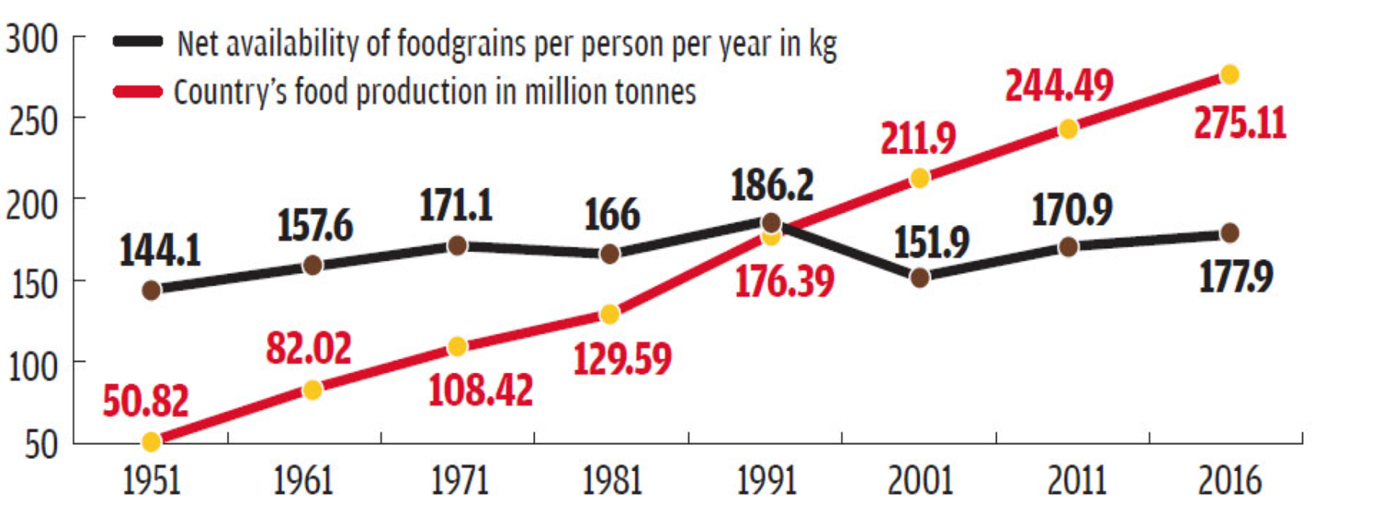Food security is crucial for ensuring access to safe and nutritious food for all. Agritech, the application of technology in agriculture, holds great promise in addressing the challenges of food security by revolutionizing agricultural practices.
An Overview of Food Security in India:
Food security includes availability, accessibility, utilization, and stability of food. India faces challenges such as limited access to nutritious food, high malnutrition rates, and unequal distribution of resources. Climate change, traditional farming practices, and inadequate infrastructure further hinder agricultural productivity.
FOOD PRODUCTION IS ON THE RISE , BUT PEOPLE STILL REMAIN HUNGRY.


Source: Downtoearth.org
The Role of Agritech in Enhancing Food Security:
Agritech solutions can transform Indian agriculture by integrating technology into various aspects of the agricultural value chain. Precision farming, advanced machinery, remote sensing, drones, supply chain digitization, smart farming technologies, and water management systems can address challenges in food production, distribution, and demand-supply dynamics.
Transforming Indian Agriculture through Agritech:
A. Improving Crop Productivity and Quality
- Leveraging precision farming techniques for data-driven decisions on irrigation, fertilization, and pest control.
- Utilizing advanced agricultural machinery to streamline operations and enhance productivity.
- Enhancing crop monitoring and management through remote sensing and drones.
B. Enhancing Access to Resources and Agricultural Inputs
- Digitizing supply chain management for real-time information and efficient procurement.
- Expanding access to finance for farmers through innovative financial solutions.
- Promoting the use of smart farming technologies for efficient resource management and decision-making.
C. Sustainable and Efficient Water Management Systems
- Implementing smart irrigation techniques and IoT-based water management systems.
- Introducing water monitoring and management tools for optimizing water usage.
- Promoting water conservation and equitable access to water resources.
D. Revolutionizing Post-Harvest Management
- Reducing post-harvest losses through innovative technology and efficient storage solutions.
- Implementing improved transportation infrastructure, including cold chain logistics.
- Encouraging the adoption of cold chain solutions for better preservation and market access.
E. Enabling Market Linkages and Transparent Pricing
- Facilitating online agricultural marketplaces for direct farmer-buyer connections.
- Promoting farmer-producer organizations for collective bargaining power.
- Ensuring fair and transparent pricing through technology and information dissemination.
Government Initiatives and Policy Reforms:
The Indian government supports Agri-tech through initiatives like Digital India, Digital agriculture mission, and policy reforms. Policies related to agricultural finance, technology adoption, research, and development create an enabling environment for agritech.
Challenges and Limitations of Agritech:
Adoption Barriers to Agri-tech adoption include limited farmer awareness, digital literacy, and rural infrastructure. Addressing these challenges requires awareness campaigns, capacity-building programs, infrastructure development, and improved connectivity.
Ensuring Sustainability and Inclusivity in Agritech:
Solutions Promoting sustainable agricultural practices, addressing the gender gap, and bridging the digital divide are essential for inclusive and sustainable Agri-tech adoption. Conservation of resources, gender-inclusive policies, and bridging the digital divide will contribute to long-term viability and equitable access to agritech benefits.
Future Trends and Potential Roadmap for Agritech in India:
The future of agritech in India lies in emerging technologies like AI, blockchain, robotics, and machine learning. These technologies can optimize resource management, enhance transparency, and revolutionize decision-making. Connectivity, big data analytics, and predictive modelling will play a crucial role in the future roadmap of agritech.
In conclusion, Agri-tech has the potential to revolutionize Indian agriculture and enhance food security. By integrating technology into various aspects of the agricultural value chain, Agri-tech solutions can address challenges in food.

